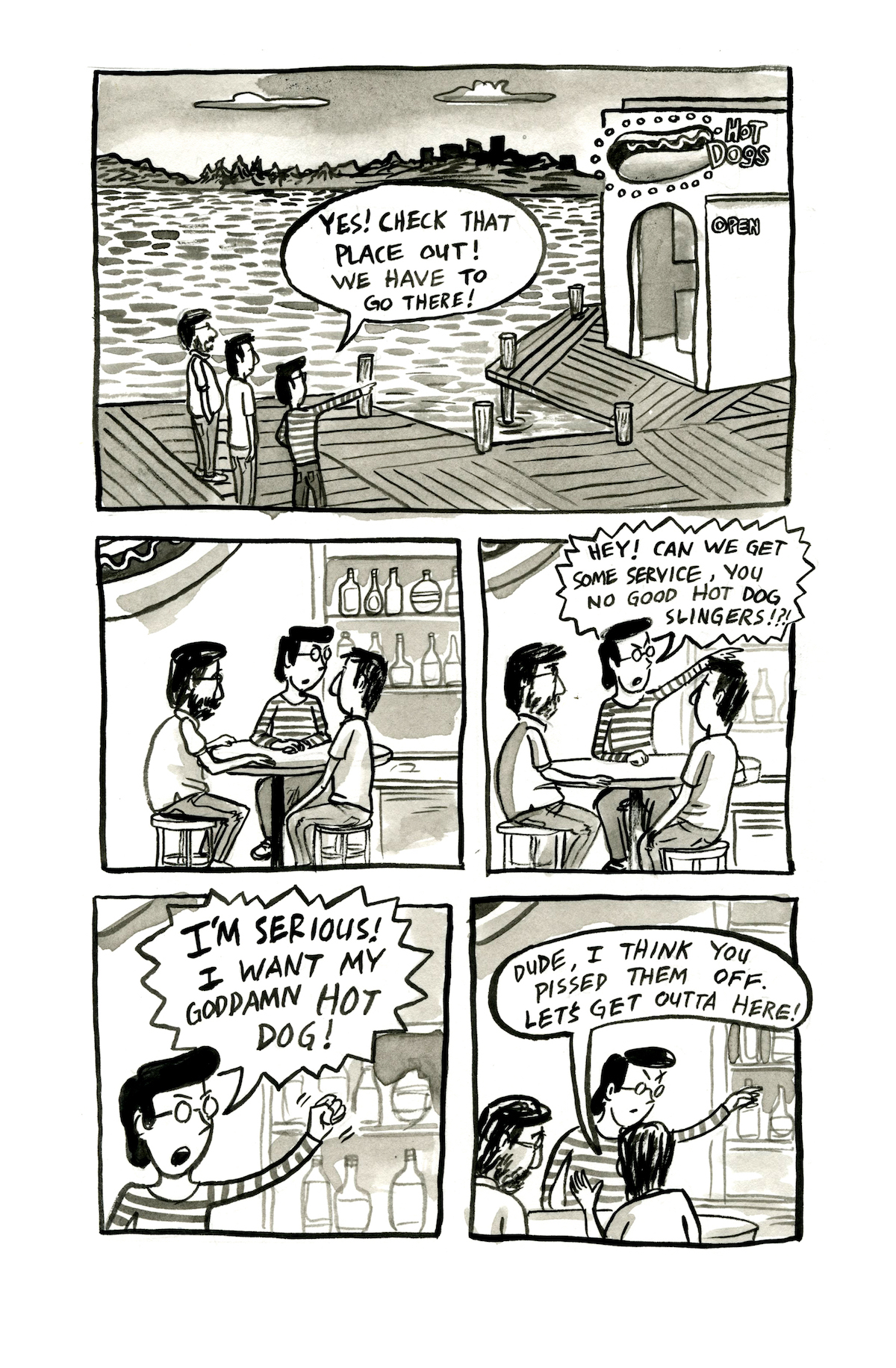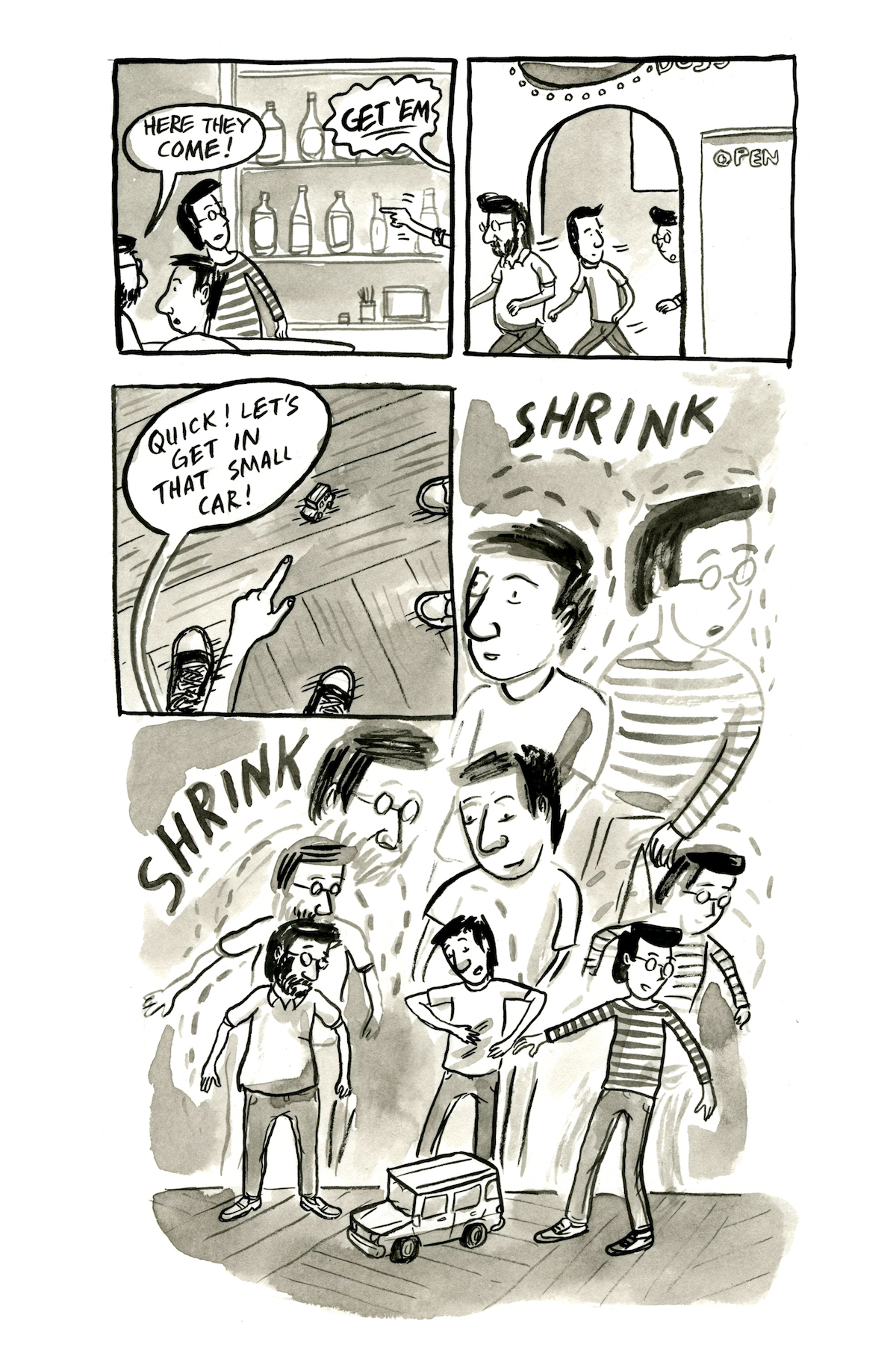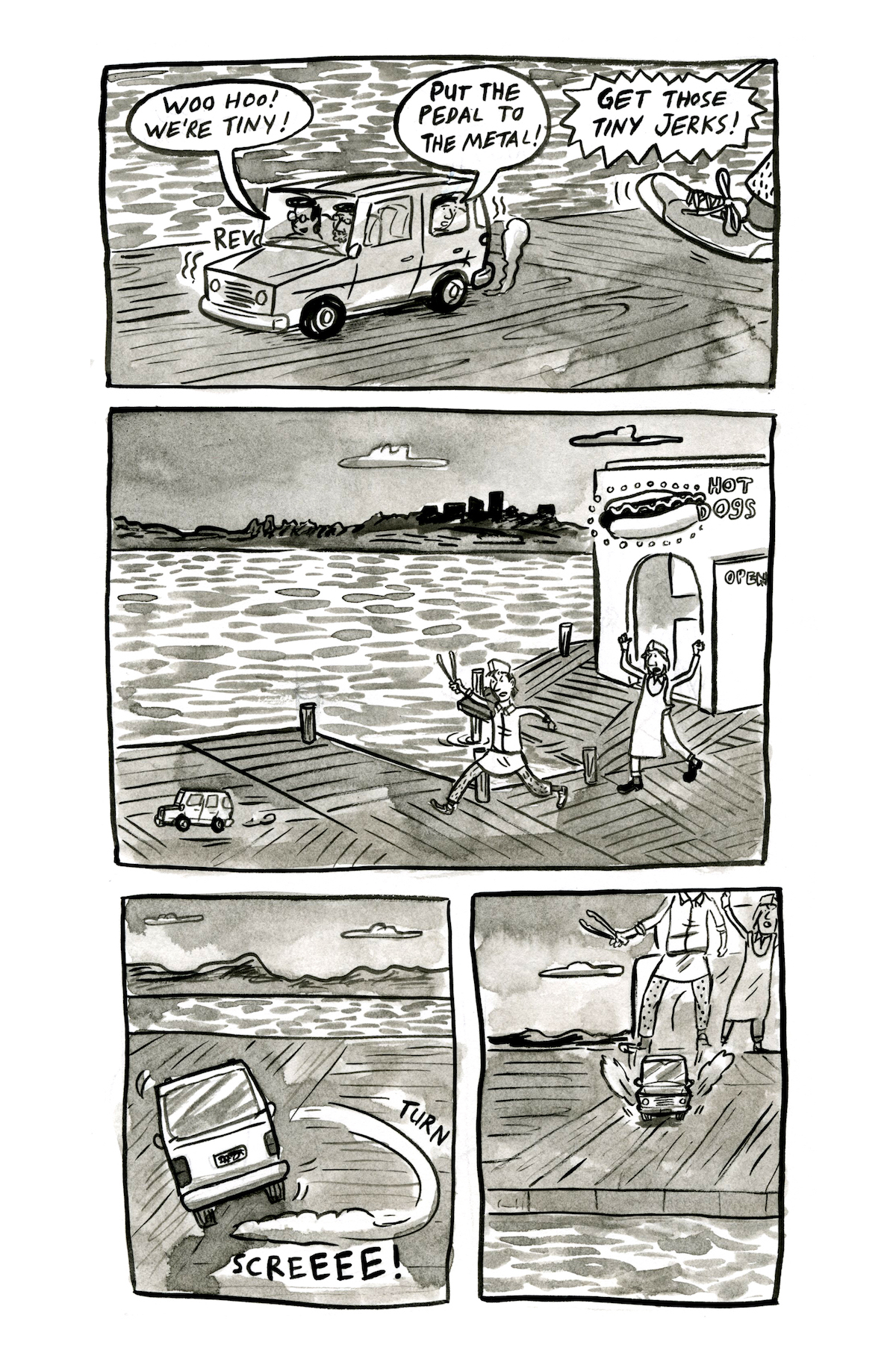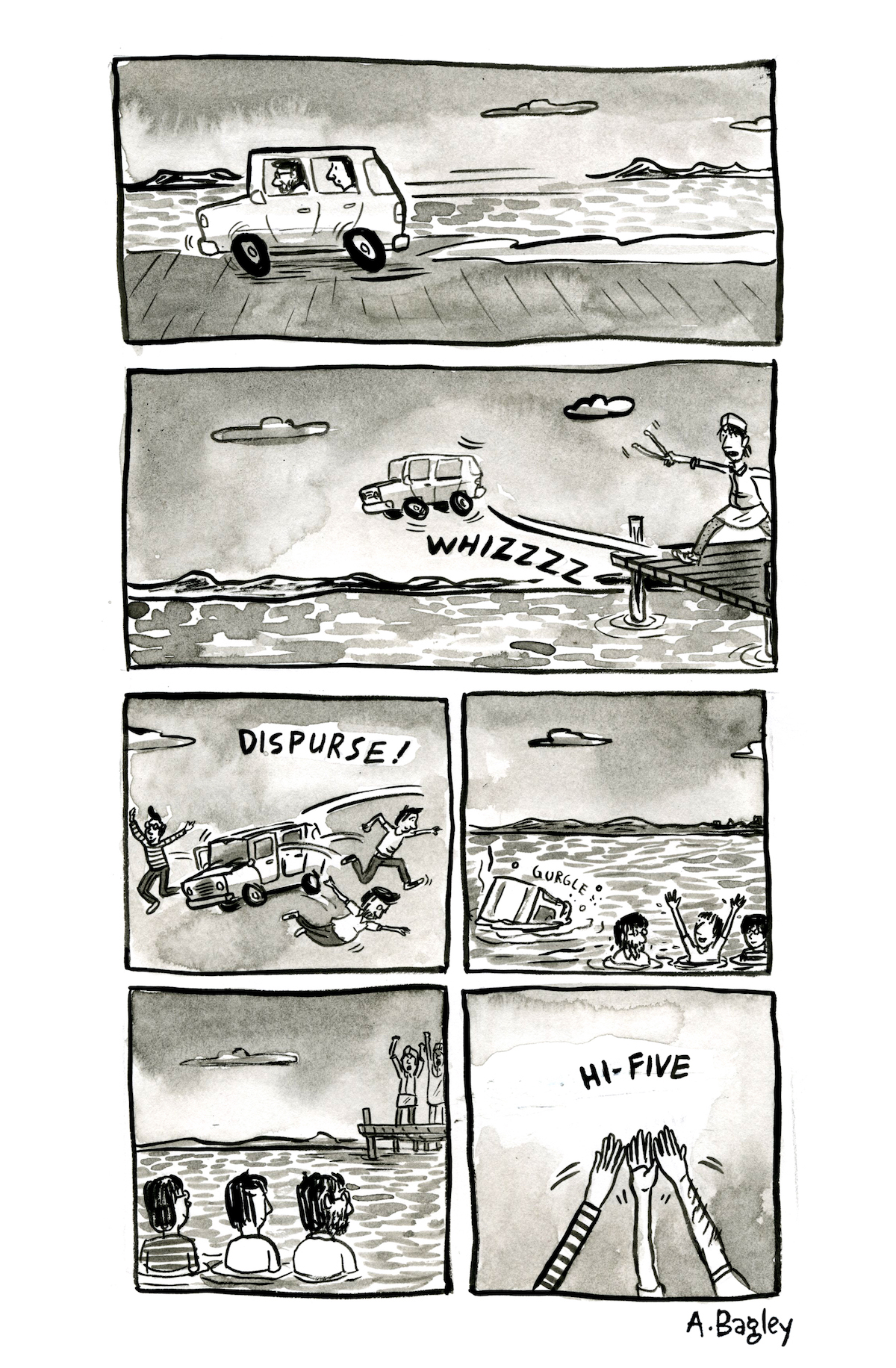Thursday Comics Hangover: The hero comics deserves
For many years, cartoonist Steve Ditko created and sold comics outside the traditional publishing system. With the assistance of comics editor Robin Snyder, Ditko sold his comics directly to the public through Kickstarter.
I've supported several of these Kickstarted books, and in the list of backers located on the inside back cover you could often find the familiar names of comics creators. The most recent Ditko comic to arrive in my mailbox this spring, The Hero, included cartoonist Stephen Bissette and comics writer Tom DeFalco — and other titles have included famous backers like Neil Gaiman.
I often thought of these books as a kind of community retirement plan for Ditko, who passed away last week at the age of 90. Marvel didn't compensate him nearly what it should have for his work in the creation of Spider-Man and Doctor Strange, and Ditko slowly stopped working for most traditional comics publishers for reasons that he always kept private. He seemed to be in need of assistance, and he was certainly not the kind of person to accept charity. So backing comics like The Hero were a way to thank Ditko for all his work, and to show him that we still loved him.
Most of Ditko's Kickstarted comics were uneven collections of text pages written by Snyder or Ditko or a combination of the two, and short comics written and drawn by Ditko. The comics tended to be collections from Ditko's archives; in The Hero, there's a comic about a hero called Killjoy that was originally illustrated in 1988.
Ditko's Objectivism is on full display in The Hero. In the Killjoy story, some civic leaders at the "Foundation to Protect the Guilty from Justice" are weeping giant tears into puddles on the floor. A wealthy-looking man named Mr. Hart goes on a tremendous, tear-soaked rant that sounds like a conservative's view of what a liberal criminal justice system would sound like:
Wah! It's unjust! Killjoy's ruining the careers of hard working criminals! They have rights! We have to help them...raise bail...hire lawyers...demand crime be made legitimate!...Wah! It's cruel! When criminals can't practise their profession! Their victims never cooperate and now this Killjoy! It's too much for decent men to take! Sob! Criminals are as law-biding as non-criminals.
Then the Foundation goes no a protest march, with signs reading: "Our first concern is for the guilty," "We need a union for hard working criminals," "For every guilty victim, there is an innocent criminal."
Of course Mr. Hart is mugged by criminals and he makes excuses for them even as they smash the teeth out his face. And of course Killjoy crushes the criminal syndicate (which includes a man dressed like Robin Hood, a coal miner, a gorilla, a lion wearing a domino mask, and a python.) It's exactly as philosophically simple-minded as you'd expect a comic from one of Ayn Rand's most devoted acolytes to be.
But there's a lot of fun, too, including a short comic about a hero called Mr. Quiver, a big-bellied bald man who eats Jello and defeats the bad guys by absorbing their punches and jiggling them back at them. Originally drawn in 1985, the strip seems like an early pass at Speedball, the bouncing boy superhero Ditko would create for Marvel a few years later.
But the title story in The Hero is the true gem. Drawn in 2009, it's Ditko's superhero work reduced to its purest form. It begins with a splash page of a man in a garish wavy-lined costume with a giant "V" on his chest. He carries a large club, and he announces, "I'm the Villain! Initiation of force, might, is good, right, just! No one dares oppose me!"
Of course, then a man in a suit with a giant "H" emblazoned on it shows up. The Villain identifies this man as "The Hero," but The Hero doesn't talk in the course of the story. He just laughs: "HA HA HA HA." Meanwhile, in the background, a large group of people — presumably the general public — mocks The Hero and praises The Villain.
The Villain and The Hero get in a fistfight for a couple of silent pages, and then The Hero knocks The Villain out cold, smacking him into a pile of garbage and rats. Triumphant, The Hero then seems to, as best I can tell, juggle a bunch of cylindrical cacti wearing cowboy hats in the final panel while the general public grumbles that the fight was rigged.
The art in this comic is beyond loose, but it it distinctly Ditko. It feels like every line has to be there, that Ditko willed it to be. On a pure black and white page, his certainty is a beautiful thing to behold.
Book News Roundup: Are hate groups protected speech in libraries?
- At The Tyee, Geoff Dembicki wrote a great piece titled "The Socialist Activists Fighting Amazon In Seattle."
At the top of the hierarchy is Amazon. And at the bottom are record numbers of homeless people. The rise of Seattle’s socialist movement can be explained in part by its ability to link the city’s inequality to a wider critique of capitalism. Amazon may have succeeded in crushing the business tax earlier this year. But Socialist Alternative’s Sawant, as well as all the activists working alongside her, helped ensure that the tax was on the city’s agenda to begin with.
Congratulations to Seattle comics writer G. Willow Wilson, who is going to write the Wonder Woman series for DC Comics. This is a high-profile gig — the inevitable collection of Wilson's run will likely be the Wonder Woman book that DC promotes to new readers when the second Wonder Woman movie debuts in theaters next year.
Here's a great interview with the women behind the literary magazine Glimmer Train, which is closing down next year.
So the American Library Association recently revamped their Library Bill of Rights. Get a load of this (emphasis mine):
[The Intellectual Freedom Committee] strengthened the 1991 “Meeting Rooms: An Interpretation of the Library Bill of Rights” by adding legal citations; expanding the text on the purpose of meetings rooms; and clarifying the description of admission fees. The interpretation cites specific examples of groups that may choose to use meeting rooms.
“If a library allows charities, non-profits, and sports organizations to discuss their activities in library meeting rooms,” states the interpretation, “then the library cannot exclude religious, social, civic, partisan political, or hate groups from discussing their activities in the same facilities.”
Uh, sorry, no. Hate groups are not protected speech. Hate groups are shouting "fire" in a crowded theater. Hate groups are calling for the murder of people not like them. We need as a nation to come together and realize that white supremacists and their like aren't a political group. They're terrorist organizations. This isn't a slippery slope. This is about an existential threat to civlization and a real physical threat to our neighbors. Stop it.
Evening Magazine interviewed Seattle cartoonist Ellen Forney about her self-help comic Rock Steady:
Tick, tick, tick, tick, tick
Published July 11, 2018, at 12:00pm
With Supreme Court Justice Anthony Kennedy retiring, we turn to last January's Red Clocks, by Leni Zumas. Reviewer Jessica Mooney looks at the book-flap question raised by the book: what is a woman for?
New Hire: Meet Rob Arnold, the Hugo House's new events curator
At the end of June, Hugo House announced that they had hired Rob Arnold to fill the events director position previously held by novelist Peter Mountford. The press release cited Arnold's impressive resumé — he "has held key positions at Ploughshares, Beacon Press, Fence Books, the National Poetry Series, PEN New England and, most recently, at the literary agency Aevitas Creative Management in Boston, Massachusetts" — and his education as a poetry undergrad at the University of Washington.
Over the phone, Arnold sounds elated about his new job — and, if anything, he seems even more excited about coming back to Seattle after many years on the east coast. Arnold recalls coming to the House back when it first started in the late 1990s. "I really gravitated toward [Hugo House's] sense of community," he explains.
"I've been aware of Hugo House for a long time," Arnold says, and as he's established a literary life on the east coast, "I've been watching the House from afar. Peter [Mountford,] especially, has really brought its event series into national prominence. When he announced that he was leaving, it seemed like a really good opportunity to come back."
Arnold has roots in Seattle, and returning to its peculiar Northwestern rhythms was easy and enjoyable for him. "I keep joking with my east coast friends when they ask me how Seattle is. I say 'it's relentlessly pleasant.'"
It helps that Arnold is intimately familiar with the Northwestern tradition of poetry. At UW, he explains, "my first very first workshop was with Rick Kenney." he says that experience "really opened my brain in the best possible way, and so I studied with him a lot. I was a Rick Kenney acolyte." He also learned from Linda Bierds and Robert McNamara.
I ask Arnold if he can think of any literary events he's attended that especially stood out as something he'd like to emulate at the Hugo House. "Any time Margaret Atwood is in a room, it's going to be remarkable," he says. "But I remember seeing Margaret Atwood at the Boston Book Festival interviewed by Kelly Link." Link at first seemed like she might feel "dwarfed" by Atwood's brilliance, Arnold says, but "Atwood was so incredible and so generous and just fiercely intelligent, and it was one of the most riveting experiences."
Arnold will be putting together the very first events in Hugo House's brand-new home. "Part of my role, of course, is to curate to the new space, but so much of what Hugo House has been doing already has been so vital and so compelling to the community that following the guidance of my predecessors is going to be something that I keep in mind a lot."
"We do have this amazing new theater space that's going to be really thrilling," Arnold says. "It will seat 150 and then they'll have expanded seating available for more."
But even Arnold doesn't know what the events slate will look like a year from now. "I'm still getting to know the space and I imagine that once I get to know all the different spaces we have to work with, I'll be booking different kinds of events to occupy different parts of the space in the building."
You can expect some popular House reading series to continue, including the themed Literary Series and the craft conversations. Arnold is excited about incorporating more genre authors into the series, including a craft talk from mystery author Elizabeth George. "I'm looking at erasing some of the boundaries that have existed a little bit too long between literary and genre. I think those boundaries are blending a little bit now, particularly in the post-Harry-Potter age when people feel less divided about genre."
What other sneak previews can Arnold provide? "Lauren Groff will be taking part in our fall series. That's super exciting for me. And the poet Natalie Diaz is going to be doing a really amazing event for us on the Edward Curtis legacy. That's going to be really interesting."
Hugo House, he says, is "a community center, and we're working with a lot of other literary organizations — hosting events for them, working with them in partnership — and so we're not just a resource for writers, but a resource for writing and literary arts in general in the city, like a portal to the larger literary world."
One of Arnold's central missions is to strengthen the House's "commitment to equity — racial equity, economic equity — and reaching audiences that sometimes the literary community can forget about." It's his job, maybe most importantly of all, to open the House to people who don't even know they're welcome there yet.
Small towns need books (all towns need books)
Skykomish's Little Free Library was launched by Savannah Slone and her girlfriend to give the small town's readers better access to books that touch on poverty and LGBTQIA+ issues (among others). Books available — as of publication — in the exceptionally well-curated library include Roxane Gay's Hunger, Amanda Lovelace's The Princess Saves Herself in This One, Ariel Gore's We Were Witches, and Jeannette Wall's The Glass Castle.

In my rural Washington community, I'm the new owner of a Little Free Library, which my family and I named "Bookworm Exchange." Visitors can take a book, leave a book, or both. My girlfriend and I received a grant to bring our new library to Skykomish with the intention of increasing access to books for our impoverished community. We both have lived in poverty and exist within the LGBTQIA+ community, and books are vital to our feeling heard, included, and worthy. We understand the importance of having free books available, especially for people who don't feel accepted or represented.
It’s safe to say most people are shocked at just how small Skykomish is: a population of just 216. When I graduated from Skykomish High School in 2013, I was the only person in my class. Even though Skykomish School District serves not just Skykomish, but the surrounding communities of Timberlane, Mill Town, Grotto, Baring, and Index, there are currently only 43 students in the entire school district. Preschool through twelfth grade are educated in a single building.
I grew up and still reside in Skykomish, where 96% of the population is white and 19% of the residents live below the poverty level. Eighty-two percent of Skykomish School District students are on a free or reduced-price meal plan. I was raised in one of these low-income households, and I know what a difference having access to books can make: without books, I'd have grown up only knowing the life stories of my peers, people with backgrounds very similar to my own. It would have been years before I interacted with and learned to value people outside of my community. This happens often in our town; small schools come with many benefits, but they also come with geographic isolation, small class sizes, and limited class offerings and extracurricular activities.
As a member of the LGBTQIA+ community, I also know how uplifting it is to feel represented in the books you read. When young readers get their hands on stories they can relate to, they feel less alone. Having the opportunity to read outside of what they know increases empathy and understanding of ethnicities, gender identities, sexual orientations, abilities, and other life experiences that might be different than their own.
If I hadn’t had books with characters that I could relate to, growing up in a small town with few if any others who identified as I did would have been even tougher than it was. Simply living in an isolated area feels secluded and lonely. When you're struggling to pay bills or are a part of a marginalized group, there is an even greater sense of isolation that feeling heard can mend, at least to a degree. Reading about queer people, as well as about people living without much money, made me feel like I wasn’t alone.
Because Skykomish is so remote, our local King County Library System location can't be open as often as libraries. With such low circulation, there isn’t enough need. It's also difficult to find qualified staff willing to work more than three days a week in as rural an area as Skykomish. But the beauty of libraries is that everything is available for free, and that matters even more in small towns with limited resources. I've considered my local library a home away from home for as long as I can remember. I wouldn’t have been able to afford the books I’ve been fortunate enough to have access to without the Skykomish library. Skykomish doesn’t even have a grocery store — so, while the library is a necessity to our community, it is most certainly a privilege as well.
Thomas Jay, Superintendent of Skykomish School District, says, “The Skykomish community is not as passionate about literacy and reading as one would suspect or hope.” He attributes this to a lack of parental involvement and overall motivation. But maybe it's a question of access, too? By offering a variety of diverse books to anyone, at any hour of the day, we're creating the opportunity for an upturn in the town’s readers.
The Little Free Library is just a starting point. I also plan to hold events and start clubs to continue advocating for our town’s developing readers. My hope is that encouraging reading with our Little Free Library will play some role, no matter how small, in helping the youth of Skykomish feel less detached from the rest of the world. These kids would benefit from having more access to books that expand their worldview — and that represent them.
The personality test
Published July 10, 2018, at 11:48am
Why are we so obsessed with knowing a presidential candidate's heart? Is it even possible to know "the real" Barack Obama, or Hillary Clinton, or Donald Trump? Is there a better way to judge a president than by the content of their character?
And the Moon
And the moon, high above
and removed from all,
will decide when to exile her
from eden. When to begin
the ruination of a life. When
to pull rivers from virgin wombs.
And the girl, down below
and under it all
will never question the day
she becomes unclean. Will learn that
some things will never be
her choice. Will see a rock
govern her body
before she ever will.
Meta-metamorphosis
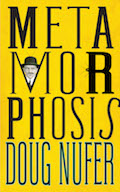
Here's the re-mix of one of literature's most famous first lines:
As gorger Gregor Samsa awoke one morning on grim neon rumor, weak as sudsy foam from meaner omen uneasy dreams, he found himself off due hush-framed snore mail transformed in his bed shied bin taint into a tacit ensign giant insect.
Kafka's original is an anacoluthon — a sentence that seems to make sense until it suddenly doesn't. Nufer's version seems not to make sense until it suddenly does. Read more on our sponsorship page, but leave yourself a trail of crumbs. Not to mix story metaphors, but you could easily find yourself happily lost in this one.
Thanks to sponsors like Sagging Meniscus Press, we were sponsor-supported for every week in the first half of 2018. We’ve just released our sponsorship blocks for July through January, and they're going quickly. We'd love to see your book, event, or service for writers promoted here. By sponsoring, you help us publish great columnists and reviewers — and you get exposure to Seattle's most passionate readers, writers, and book professionals. We look forward to hearing from you!
Your Week in Readings: The best literary events from July 9th - July 15th
Monday, July 9: What the Eyes Don't See Reading
Dr. Mona Hanna-Attisha is a pediatrician who helped to blow the whistle on Flint's water crisis (which is, I would like to remind you, still ongoing.) Her memoir about that experience is titled What the Eyes Don't See: A Story of Crisis, Resistance, and Hope in an American City. Langston Hughes Performing Arts Institute, 104 17th Ave S. https://www.langstonseattle.org/, 7 pm, free.Tuesday, July 10: Karen Lord
Clarion West brings a Barbadian author from the Caribbean to Seattle as part of their fantastic summer reading series. She'll discuss sci-fi and teaching sci-fi. Seattle Public Library, 1000 4th Ave., 386-4636, http://spl.org, 7 pm, free.Wednesday, July 11: Spoonbenders Reading
Daryl Gregory's novel Spoonbenders is a novel about a family of psychics. It's already been signed for a big adaptation to television and it was a big old bestseller on its release. Now it's out in paperback, and Gregory just moved to Seattle. Come on out and meet one of Seattle's most popular authors. Elliott Bay Book Company, 1521 10th Ave, 624-6600, http://elliottbaybook.com, 7 pm, free.Thursday, July 12: Forms of the Book
This one looks like a doozy. Three of Seattle's smartest, most inventive writers — Amaranth Borsuk, Doug Nufer, and Shin Yu Pai — get together to discuss the past present and future of the book. Ada’s Technical Books, 425 15th Ave, 322-1058, http://seattletechnicalbooks.com, 7 pm, free.Friday, July 13: The Rat Tree Reading
The Seattle novelist Susan M. Carr reads from her latest book, about family reunion at a pool party. In the middle of the party, two young family members accidentally uncover their grandfather's big trunk full of Nazi memorabilia. Things unravel from there. University Book Store, 4326 University Way N.E., 634-3400, http://www2.bookstore.washington.edu/, 7 pm, free.Saturday, July 14: Hot Off the Press Book Fair
See our Event of the Week column for more details. Fantagraphics Bookstore & Gallery, 925 E. Pike St., 658-0110, http://fantagraphics.com/flog/bookstore, 5 pm, free.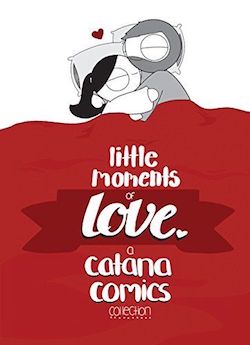
Sunday, July 15: Little Moments of Love Reading
I love Catana Chetwynd's comics. Her characters look like fetuses — half-formed round heads with huge eyes and stubby little hands — but she uses them to capture moments in a relationship: differences in height, weird food hangups, drunken shenanigans. They're fantastic little windows into a very private part of life, usually shared between two people. University Book Store, 4326 University Way N.E., 634-3400, http://www2.bookstore.washington.edu/, 3 pm, free.Literary Event of the Week: Hot Off the Press Book Fair
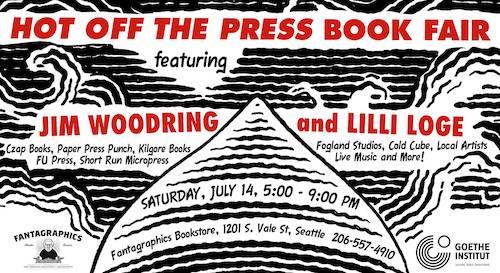
For four years now, Fantagraphics has celebrated summer with a fantastic little laid-back book festival called the Hot Off the Press Book Fair. It's pretty simple: exhibitors set up tables and sell comics in and around the Fantagraphics Bookstore and Gallery. Creators sign books. Comics nerds share the gossip and blab about freelance rates. And then the Georgetown Art Attack happens all around the fair, giving attendees the opportunity to see even more fun stuff.
This year's Hot Off the Press guest of honor is Jim Woodring, who is the best cartoonist in all of Seattle. Woodring is unveiling his brand-new comic Poochytown, which continues the story of his bizarre little cartoon character Frank and his adventures in the Unifactor, a prickly cartoon universe with its own rules and physics.
Woodring is sharing the stage with German cartoonist Lilli Loge, who has created a special Tijuana Bible for the occasion. (If you don't know, Tijuana Bibles were sex comics starring bootleg versions of popular cartoon characters like Mickey Mouse, Popeye, and Dagwood Bumstead.) Loge and Woodring will team up to create a site-specific art installation during the show.
Other Seattle cartoonists including Simon Hanselmann, DW, Marc Palm, Tom Van Deusen, Max Clotfelter, Sarah Romano Diehl, Kelly Froh, Laura Knetzger, and more will be in attendance, selling their latest books. Local publishers like Cold Cube and Paper Press Punch will be tabling at the show, too.
Unlike most shows, which generate a kind of claustrophobic feel, Hot Off the Press feels more like a stoop party. If you get sick of browsing the booths inside, you can step outside and check out the comics on the sidewalk. Fantagraphics supplies the food and drink, Georgetown provides the ambiance, and our best cartoonists offer up the entertainment. Seems like a perfect summer evening to me.
Fantagraphics Bookstore & Gallery, 925 E. Pike St., 658-0110, http://fantagraphics.com/flog/bookstore, 5 pm, free.
Get Your Tickets Now: Presale for Neil Gaiman and David Sedaris, Short Run Summer School
A couple of neat opportunities you should know about:
Northwest Associated Arts is having a special discounted presale for a few upcoming events: Neil Gaiman at Benaroya Hall on November 18th, 2018; David Sedaris at Benaroya Hall on November 19th, 2018; and Anne Lamott at Benaroya Hall on April 7, 2019. Ticket prices will go up after the sale ends, and you should be warned that the presale ends at noon today, so get your tickets now. (Full disclosure: I'm introducing both Gaiman and Sedaris, but I'm not paid to do the introductions outside of two free tickets to each event.)
Short Run Comix & Arts Festival is gearing up for their annual Summer School program. This year's classes include some great free opportunities (A comics class in the park taught by Mita Mahato! A comics-themed exporation of low tide pools in Lincoln Park!) and very affordable classes in comics inking, animation, and a couple different kinds of printing. Learn more at Short Run, or check out this nifty graphic:
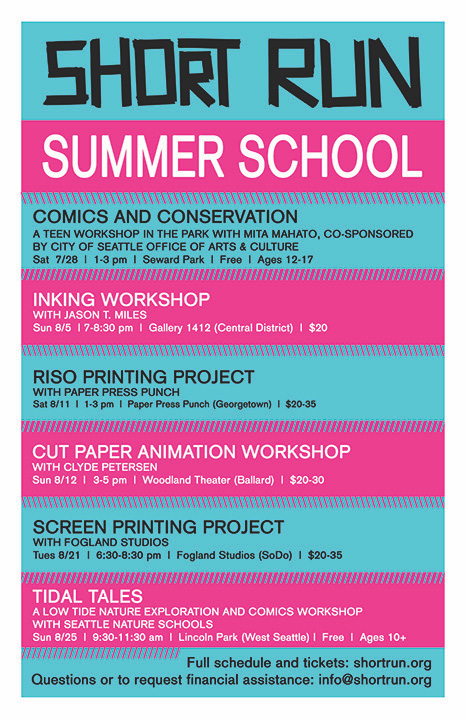
Mail Call for July 8, 2018
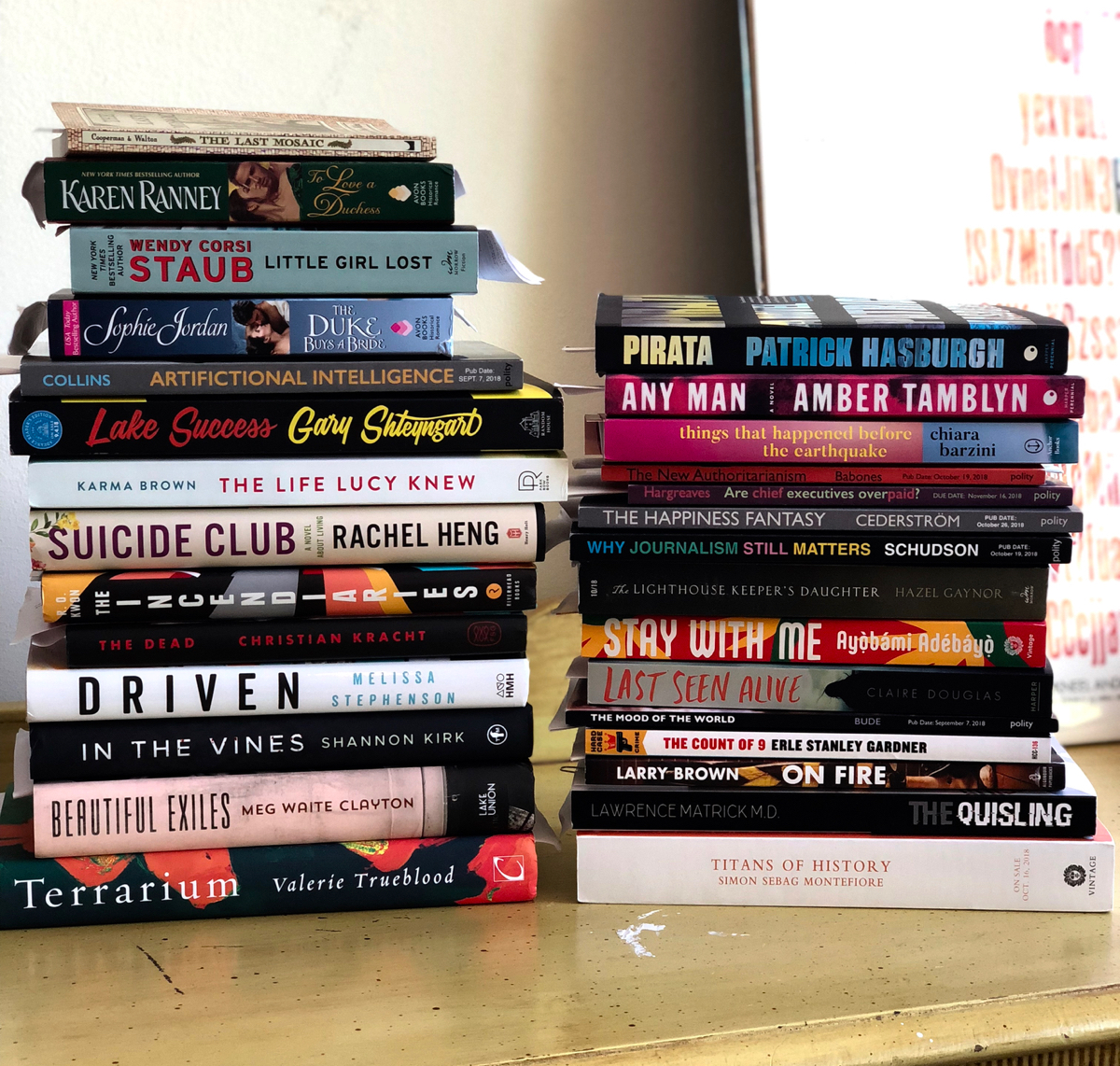
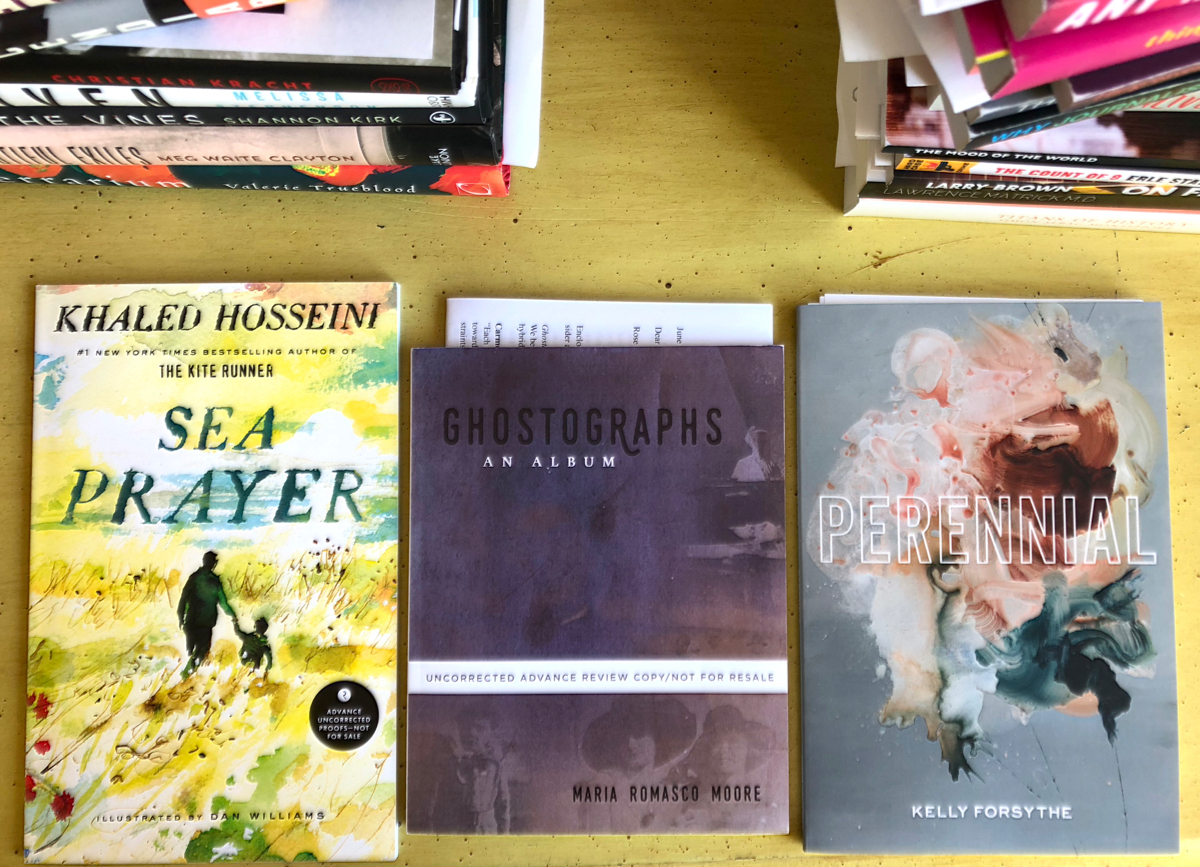
The Seattle Review of Books is currently accepting pitches for reviews. We’d love to hear from you — maybe on one of the books shown here, or another book you’re passionate about. Wondering what and how? Here’s what we’re looking for and how to pitch us.
The Sunday Post for July 8, 2018
Each week, the Sunday Post highlights a few articles we enjoyed this week, good for consumption over a cup of coffee (or tea, if that's your pleasure). Settle in for a while; we saved you a seat. You can also look through the archives.
Survival of the Richest
It’s time for a tech revolution. No, not that revolution — the other one, where we re-write our future without an apocalypse. Here’s media thinker/writer Douglas Rushkoff on the folks who can afford, literally, to be fatalist about where this all is heading. Are we going to sit back and let them build a world only they can survive? Well, are we?
When the hedge funders asked me the best way to maintain authority over their security forces after “the event,” I suggested that their best bet would be to treat those people really well, right now. They should be engaging with their security staffs as if they were members of their own family. And the more they can expand this ethos of inclusivity to the rest of their business practices, supply chain management, sustainability efforts, and wealth distribution, the less chance there will be of an “event” in the first place. All this technological wizardry could be applied toward less romantic but entirely more collective interests right now.
They were amused by my optimism, but they didn’t really buy it. They were not interested in how to avoid a calamity; they’re convinced we are too far gone. For all their wealth and power, they don’t believe they can affect the future. They are simply accepting the darkest of all scenarios and then bringing whatever money and technology they can employ to insulate themselves — especially if they can’t get a seat on the rocket to Mars.
Disposable America
Something’s changed lately in the land of iced coffee: the tide of public opinion has turned against the humble and, yes, environmentally harmful drinking straw. Alexis Madrigal traces the utensil’s history (which is sort of like the story of the three little pigs, if their houses had been made of straw, paper, and plastic) and, fascinatingly, its entanglement with the evolution of capitalism in the United States.
Global competition and offshoring enabled by containerized trade was responsible for some of the trouble American manufacturing encountered in the 1970s and 1980s. But the wholesale restructuring of the economy by private-equity firms to narrow the beneficiaries of business operations contributed mightily to the resentments still resounding through the country today. The straw, like everything else, was swept along for the ride.
Expecto patriotism: the magical yet dark world of Russian Harry Potter rip-offs
Apparently, one of the seven basic plots on which all stories are built is Harry Potter. A thriving sub-genre of Russian fiction is looking to capitalize on the incredibly successful series — but with a few tweaks.
In the Porry Hatter series Harley, a rip-off Hagrid, tells Porry, a rip-off Harry, about the house elves, a magical species recently freed from slavery, led by a character known as Martin Luther King Jr. And, controversially, how the elves, after becoming free citizens, became lazy, living solely off crime. This xenophobic attitude might not be exclusively Russian but is still very widespread here. “Ideas of getting a job and becoming a part of our society turned out to be alien to the newly freed house elves, and they, not knowing what to do with all their free time, started to steal, beg, listen to rap music, and — what would you think? — fight with each other,” Harley explains.
The Eugenicist Doctor and the Vast Fortune Behind Trump’s Immigration Regime
A classic “how the money moves” piece by Brendan O’Connor, showing how powerful a single person’s racism and hate can be — if the person has enough money. In this case the person is John Tanton, an ophthalmologist and eugenicist who used someone else’s fortune so effectively to advance the anti-immigration cause that he might be considered the father of our current ICE. Immensely frustrating to see yet another example of just how much money does, and how the very rich can protect their privilege today while shaping a future where their power will continue to consolidate and grow.
Um. Well, we went a little grim there at the end, but it’s a good read regardless.
While the Center for Immigration Studies bills itself as an independent, non-partisan research organization, it is in fact a key node in a small network of think tanks and nonprofits, founded and directed by a man whose private correspondence contains praise for anti-Semites, fascists, and race scientists of various ideological backgrounds, many of whom would go on to figure prominently in today’s so-called alt-right and financed largely by one of the oldest and wealthiest families in America.
Falling Men
No matter how indifferent you are to the World Cup, this essay by Alejandro Chacoff on the art of the fake fall will charm your shin pads off. Honestly, I had to Google just now to see whether the tournament was over so I wouldn’t embarrass myself (more), and I still followed this to the last delightful line. Like the role of the hockey enforcer, taking a dive in soccer/football (your pick) is one of those sociological side-turns that only sports can offer with a straight face. Read on!
Most of my American friends don’t understand why certain players fall at the slightest touch. The dive is something beyond their grasp. It involves two grave infringements of American morality in sports: a willingness to cheat, and the demonstration — perhaps the celebration — of physical weakness and self-pity. (The flop, basketball’s closest equivalent, is less dramatic and tends to be associated with foreign players.) To be strong and athletic, full of skill, and then to break down once you reach the penalty area seems absurd. In many ways it is.
Whatcha Reading, Anca Szilágyi?
Every week we ask an interesting figure what they're digging into. Have ideas who we should reach out to? Let it fly: info@seattlereviewofbooks.com. Want to read more? Check out the archives.
Anca Szilágyi is a Seattle based writer, originally from Brooklyn. We said her wonderful first novel, Daughters of the Air, "feels as real and as insistent as the vein pulsing just over your right eye" and was "a creation of unearthly talents." She's been awarded fellowships from Hugo House and Jack Straw, was the inaugural Artist Trust / Gar LaSalle Storyteller Award recipient, and was awarded a grant from 4Culture to work on her novel-in-progress Paralegal.
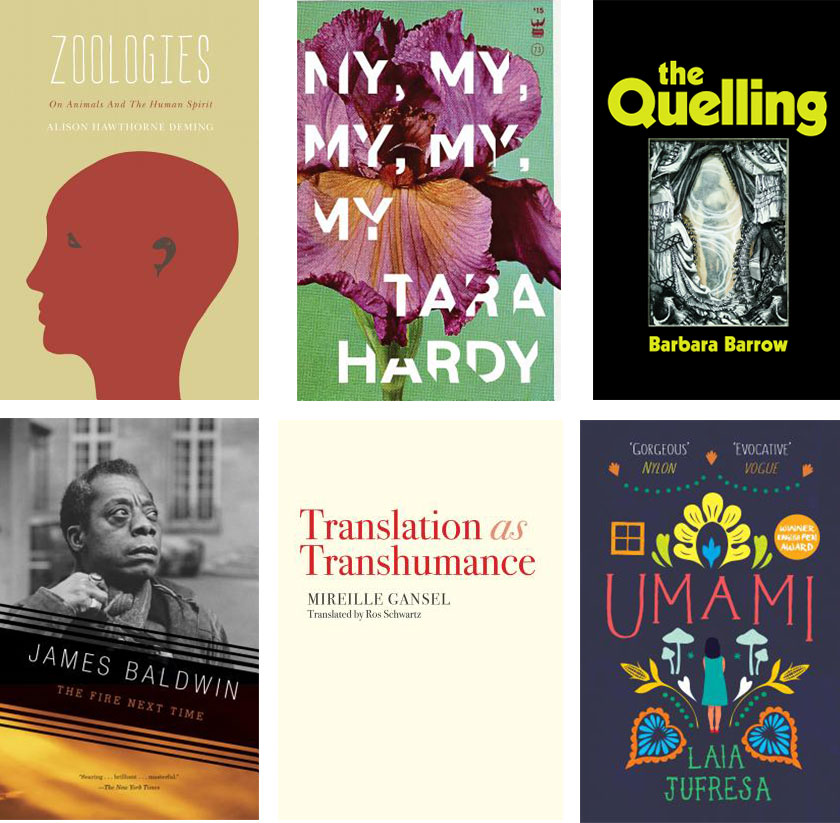
What are you reading now?
I'm part way through Alison Hawthorne Deming's Zoologies, a collection of essays exploring animals and the human imagination. There's a great anecdote about crows dropping walnuts in crosswalks, letting cars crush them open, and safely swooping down for the tasty nut meat when pedestrians have the light. I'm also falling in love with Tara Hardy's poetry collection My, My, My, My, My, which is just so vulnerable and vital.
What did you read last?
I gobbled an advance review copy of Barbara Barrow's The Quelling, out in September from Lanternfish Press (full disclosure: LFP is my publisher). It's about twin sisters growing up in a psychiatric hospital after being accused of murder as children. It's ferocious and eerily tender.
This past weekend, I also devoured The Fire Next Time, by James Baldwin. I found myself jotting down many quotations, but this one is essential: "Everything now, we must assume, is in our hands; we have no right to assume otherwise...If we do not now dare everything, the fulfillment of that prophecy, re-created from the Bible in song by a slave, is upon us: God gave Noah the rainbow sign, No more water, the fire next time!"
What are you reading next?
I'm eager to read Translation as Transhumance by Mireille Gansel (trans. Ros Schwartz) which the publisher describes as "half memoir, half philosophical treatise" that "muses on how translation can be an exercise in empathy between those in exile." Also in the queue, Umami by Lala Jufresa (trans. Sophie Hughes). I have a soft spot for precocious 12-year-old protagonists. Plus the word umami and the name Lala Jufresa make me smile.
Steve Ditko, 1927 - 2018
Steve Ditko, the cartoonist who brought characters including Spider-Man, Dr. Strange, Hawk and Dove, the Creeper, and the Question into the world, has died of a heart attack. He was 90 years old. Ditko was famously an Objectivist who devoutly followed the word of Ayn Rand — he believed that moral grey areas simply did not exist, and he loathed interviews, believing that an artists' work should speak for itself.
I can't stand Rand and Objectivism, but I loved Ditko's work. Without the inherent creepiness that Ditko delivered to characters like Peter Parker, I think the Marvel Comics stable of characters might have died on the vine. He drew Parker as an outcast, a freak who hated the popular kids and struggled with his anger every day. Anyone who visits MoPop to see the original Ditko page from Spider-Man's origin story in Amazing Fantasy issue number 15 can see that Ditko's tense linework shares more in common with alternative comics than the glorious heroism of Jack Kirby's comics.
That tension between Ditko's weird artwork and the rigid philosophy that eventually overtook his writing gave his work a compelling internal conflict. On every page, you'd see an artist at odds with himself, trying to reckon a messy world with a philosophy that refused to allow for messiness. His art will be studied and appreciated for many generations to come, thanks in large part to the amazing archival work of Seattle's Fantagraphics Books.
June's Post-it Notes from Instagram
Over on our Instagram page, we're posting a weekly installation from Clare Johnson's Post-it Note Project, a long running daily project. Here's her wrap-up and statement from June's posts.
June's Theme: Limitless, Stopping
When I was little, my mom brought home what turned into a coveted favorite film—I’d search for it again and again at the library, where it seemed to only surface every few years. A 1977 documentary called The Children of Theatre Street, it explored a historic ballet school in Saint Petersburg. Grace Kelly calmly narrates as Soviet-era kids in tights run around the creaky halls of repurposed early-19th-century buildings, chatting casually with each other while performing physical feats that I felt pretty firmly to be impossible. I loved ballet in a foreign, outside way; I was never going to be that kind of athlete or that kind of gender. As a grown-up artist, I will also never be able to afford ballet tickets. But a few years ago, I made a friend at an art event who often had an extra ticket, generously connected me to volunteering options, sometimes even brings me to rehearsals. The dancers are as astounding as in the movies—more astounding—and endlessly fun to draw. The art of choreography, so different from my art, fills me with frantic unexplored ideas. But the world onstage mostly ignores my world; it’s still hopelessly straight, enacting rigid leftover gender roles that make no sense on these limitless bodies. I wish I had a say in that. A rare occasion watching all-male troupe Ballets Trockadero—diverse male-bodied dancers performing en pointe, queering romantic pas de deux, tenderly supporting each other into lifts and turns—overwhelmed me with emotions the usual ballet rarely touches. Spying on rehearsals with my friend, I’m drawn to the space between the women’s performance selves and everyday selves, unmasked faces, the moment they slouch with tiredness then pull their posture up as if on a string for the next set of leaps. June is when dancers here retire, around my age I think. Carrie Imler is known for executing Swan Lake’s famous 32-turn sequence with an arsenal of double spins thrown in, lifting her arms suddenly in a move that would throw other dancers off-balance. She came back from injuries to perform it one last time, at the very end of her encore show. A huge performance hall of ballet patrons screamed like soccer fans, I felt like reality had been upended, crowds shouting and standing in waves of excitement as she spun in endless rotations. But then it does end—no one else dances it that way. The last post-it is of Red Angels, by choreographer Ulysses Dove. Even with male-female pairs, it felt somehow queerer, made me smile. But also felt slightly ominously dated, early-90s-ish in a way that set off sad little alarm bells. And yes, it was AIDS; he died in 1996, didn’t get to make half of what he should have.
The Help Desk: Tucker to the Max
Cienna Madrid is on summer break. The following Help Desk was originally published on November 13th, 2015.
Every Friday, Cienna Madrid offers solutions to life’s most vexing literary problems. Do you need a book recommendation to send your worst cousin on her birthday? Is it okay to read erotica on public transit? Cienna can help. Send your questions to advice@seattlereviewofbooks.com.
Dear Cienna,
I'm friends with a man who claims to ironically love the writings of Tucker Max. He seems like a sweet guy, but is he secretly nursing an inner bro? Should I throw an intervention, and if so, how should I do it?
Nathalie, Crown Hill
Dear Nathalie,
If your friend "ironically" loves the misogynistic writings of Tucker Max, the man known for "jokes" like: "I know this really sexy move you can do with your mouth. It’s called ‘shutting the fuck up,'" he sounds like the kind of guy who'd "ironically" joke that Bill Cosby was being a gentleman by handing out free drinks to women.
Fortunately, there is hope for people who view women as breasty garbage bags to be alternately fucked and despised, and Max himself is proof of that. Perhaps you weren't aware but he's now happily contributing to what your friend might "jokingly" call the pussification of America. His latest book, Mate, Become the Man Women Want was co-written with evolutionary psychologist Dr. Geoffrey Miller. Parts of it are still problematic (for example, in interviews Max compares dating to knowing your enemy before entering into battle). But it's also got some sound advice and when you consider the enthusiastic audience Max has built up with his previous books, his words become especially important:
Objectifying women isn’t just a moral failure. At the purely practical level of attracting women, it’s stupid. It might temporarily reduce your anxiety about approaching them (about making your pitch), because if you think of them as targets, you can try to trick yourself into thinking that they won’t be judging you when you walk up to them. But they are judging you—and that’s OK, as long as you understand how and why.
Here's the intervention I suggest: Buy Max's latest book, read it, and then give it to your friend. Tell him that you're really eager to discuss it with him and get his thoughts on Max's evolving views on women and relationships. (Also make note of the parts of Max's book that you disagree with and be ready to explain these parts to your friend.)
If your friend is resistant, join our nation's great underground army of literate feminists and their decades-long campaign to sissify our great nation: pull a Cosby and start dosing his drinks with birth control pills. I'm not a doctor – although I'm considering legally changing my first name to "doctor" for the free respect and travel upgrades – but the extra estrogen will probably help. I spent years throwing birth control pills in the open reservoir at Volunteer Park and I'm pretty sure it turned at least a few gay men I know even gayer.
Kisses,
Cienna
PS. Happy World Vasectomy Day, everyone!
Two shameless crimes, a century apart
I made a mistake at the very beginning of last night's edition of the Reading Through It Book Club. I accidentally said that David Grann's Killers of the Flower Moon was "not a political book." Of course I misspoke. For one thing, there is quite simply no such thing as an apolitical book, just as there is no such thing as an apolitical person.
But for another thing, Killers of the Flower Moon is nothing but a political book. It's the story of a series of murders in Osage Nation in the 1920s, but it's also the story of how the Osage peoples became the richest people in the world, and how greed brings out the worst in us, and how the story of America is a neverending story of genocide.
I can't stop thinking about one quote in the book, from a contemporaneous report in Harper's magazine about the Osage's newfound oil wealth:
Where will it end? Every time a new well is drilled the Indians are that much richer...The Osage Indians are becoming so rich that something will have to be done about it.
Here we have the American dream made real: sudden wealth legally and fairly delivered to hardworking people. But because the beneficiaries aren't white, the reporter felt perfectly comfortable using the language of menace in a nationally recognized magazine. And eventually, "something" was "done about it." The Osage started dying, in numbers so large that even the newly formed law enforcement division we now call the FBI had to intercede.
Members of the Reading Through It Book Club had a lot of great insights about how Killers relates to our modern era — particularly in the methods that white looters used to attack the Osage. The grifters and murderers understood instinctually that the way to attack and to dehumanize a people is by breaking their families to pieces. These are the same methods that the Trump administration is using on the border today: they're targeting an entire culture by dividing families and othering them while they are weakened and mourning.
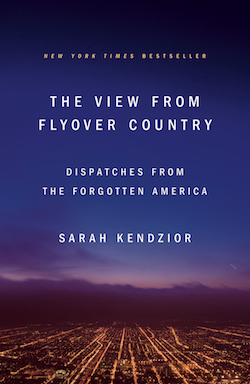
Like the murderers of the Osage people, the Trump administration is looting a culture for their own petty ends, and history will remember those ICE agents and other administration officials with the same remorseless horror that Grann reserves for the villains of Killers. And it's on all of us to bear witness, and to fight as hard as we can to keep those families together, to stop the crime before too many innocents are harmed.
Join us on Wednesday, August 1st, at Third Place Books Seward Park for the next Reading Through It Book Club. We'll be discussing Sarah Kendzior's prescient The View from Flyover Country. The book is 20 percent off at Third Place right now.
Portrait Gallery: Summer Day (Poets in the Park)
Each week, Christine Marie Larsen creates a new portrait of an author or event for us. Have any favorites you’d love to see immortalized? Let us know
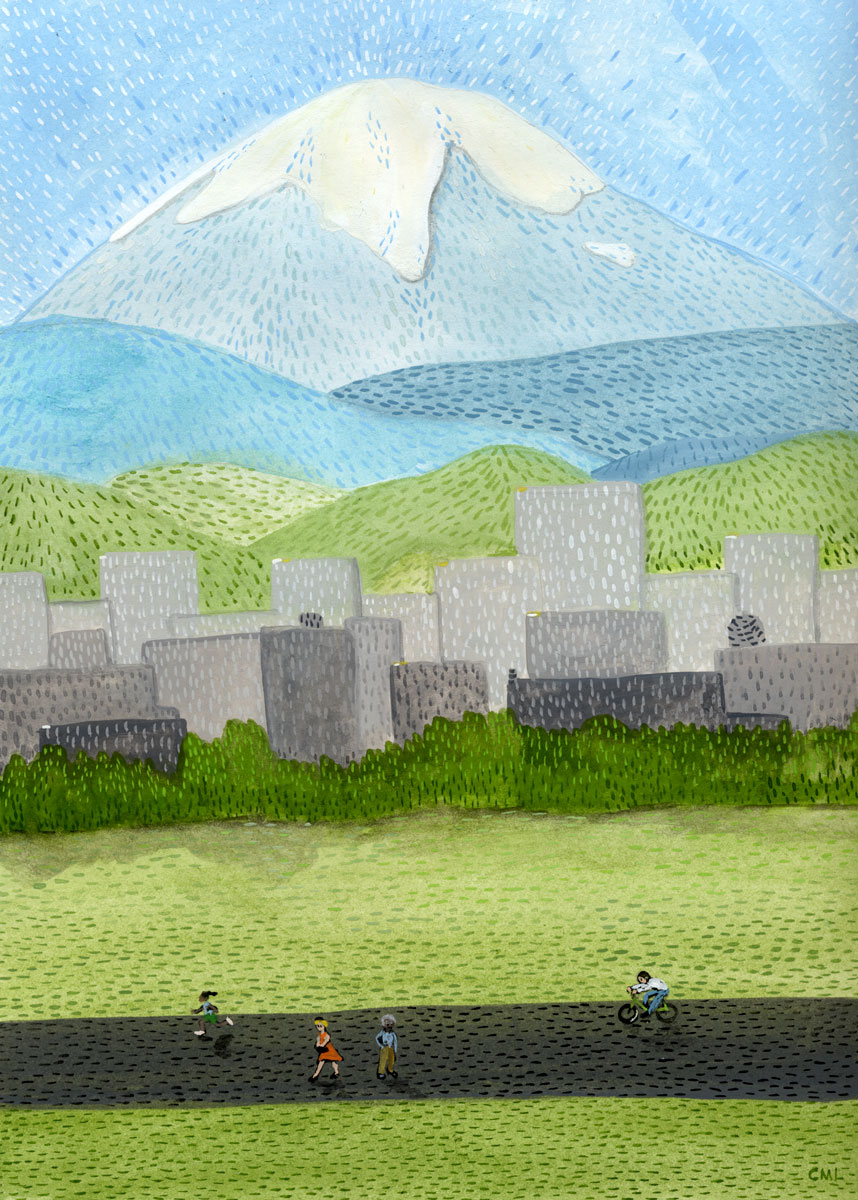
It's going to be a beautiful weekend, perfect for enjoying a day of poetry outdoors.
This Saturday, Redmond hosts the Poets in the Park celebration, an all-day hoo-hah of activities, readings, and poetry classes that is free to attend. Events include a bookmaking class for kids, poetry mini-golf, and places to create your own poetry themed art.
Anderson Park, 7802 168th Ave NE, 11 am, http://www.graceguts.com/poets-in-the-park, free
